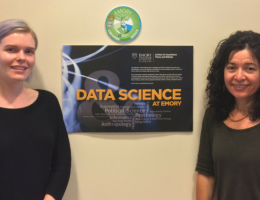Energy Awareness Highlights
From 2005-2015, Emory reduced its energy usage by more than 25 percent per square foot, supported by the awareness and commitment of the Emory community. While celebrating this achievement, Emory continues to pursue strategies to reduce fossil fuel use and greenhouse gas emissions.
Emory’s Sustainability Vision calls for a 50 percent reduction in energy use per square foot and a 25 percent reduction in overall energy use by 2025 from a 2015 baseline.
Energy Awareness Benefits
- In Georgia, our lives are largely powered by non-renewable fossil fuels, such as coal and natural gas. The burning of these fuels contributes to greenhouse gas emissions. Until our energy grid incorporates more renewable energy sources, our best emission-reduction strategy is to consume less energy.
- Emory’s Office of Sustainability has led many efforts to reduce energy consumption. Programs such as the Green Offices and Green Labs engage Emory community members by highlighting the connection between individual habits and energy reduction at the institutional level. These efforts work toward creating a campus-wide culture of awareness and conservation, providing opportunities and resources for energy conservation.
How It Works
- Introduce energy saving habits into your office by joining the Green Office program. Green Offices advance Emory toward the 2025 sustainability goal of reducing campus energy use by 25% by employing energy-saving strategies.
- Introduce energy saving habits into your lab with the Green Labs program. Emory teaching and research labs actively reduce campus energy consumption by incorporating sustainable energy strategies into their work.
- Choose one of Emory’s Sustainable Commuting options and reduce reliance on transportation which requires fossil fuel energy sources.
- Contact your Sustainability Representative to voice concerns or suggestions regarding energy conservation strategies for your building. Sustainability Representatives from each major building on campus serve as ambassadors to work with occupants to create a culture of awareness and conservation, multiplying energy-saving benefits.




